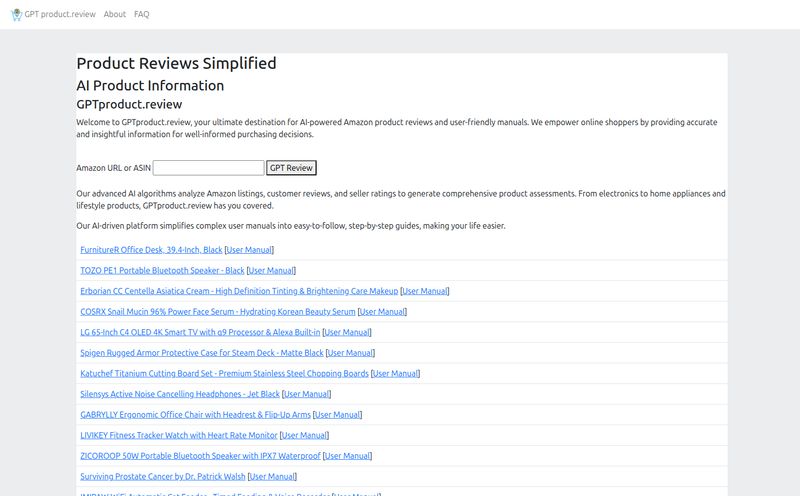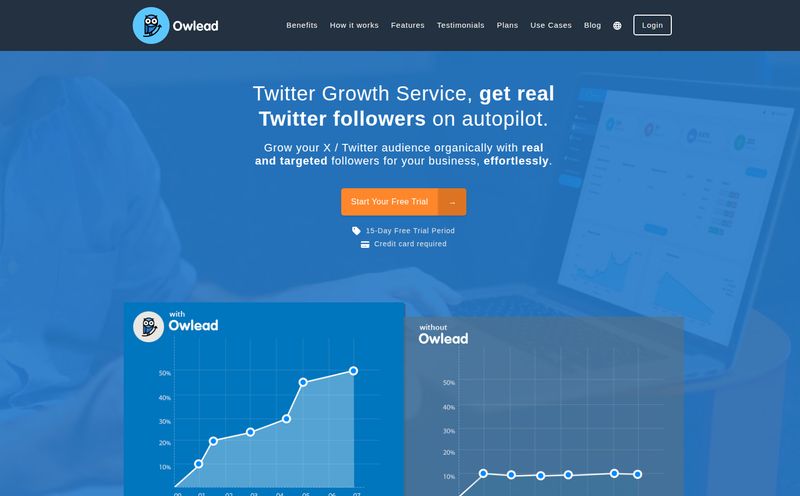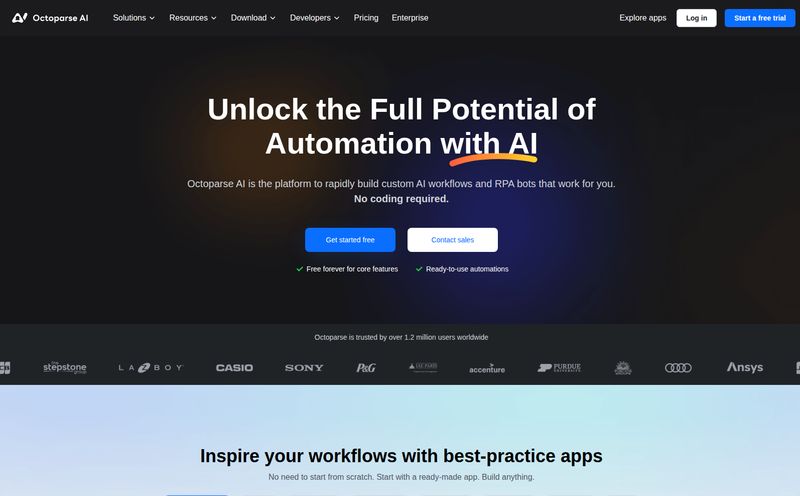I have a confession. I once spent the better part of a week manually refreshing a webpage for a specific graphics card, waiting for the price to drop. I had spreadsheets. I had alarms set. My wife thought I’d lost my mind. The sad part? I missed the 15-minute window when it actually went on sale. We’ve all been there, right? That feeling of 'I knew it would get cheaper!' followed by the crushing defeat of missing the deal.
It’s a classic shopper’s dilemma. In the SEO and traffic generation world, we’re obsessed with data and timing. So why are we still so archaic when it comes to our own shopping? Well, a tool called Pricelinks recently landed on my radar, and it promises to be the automated, AI-powered solution to my deal-hunting woes. It claims to be both a price-drop watchdog and a local store sherpa. But I've seen countless apps promise the world and deliver a pamphlet. So, I took it for a spin. Let’s see if it actually holds up.
What Exactly is Pricelinks? (And Why Should You Care?)
At its core, Pricelinks is a two-headed beast, in the best way possible. Think of it as a super-smart shopping assistant who lives in your browser. One part of its brain is constantly scanning the internet for price drops on products you’ve bookmarked. The other part is looking around your physical location to find nearby stores that have what you need. It’s a simple concept, but the execution is what matters.
We’re not just talking about a basic price checker that you have to manually consult. The secret sauce here is the 'AI-powered' bit. This suggests it's doing more than just scraping a price tag; it’s learning, predicting, and hopefully, getting you better deals without the obsessive-compulsive refreshing. For anyone who values their time—and their money—that's a pretty compelling proposition.

Visit Pricelinks
The Features That Actually Matter
A long list of features can be more distracting than helpful. I prefer to focus on what actually moves the needle. Pricelinks boils it down to a couple of key functions that work in tandem.
AI-Powered Price Drop Alerts: Your Personal Deal Hunter
This is the main event. You find a product you want online—let’s say it’s a new noise-cancelling headset for those endless Zoom calls—and you tag it in Pricelinks. That's it. You go about your life. The tool’s AI-driven system keeps an eye on it across the web. The moment the price falls to a more attractive number, you get an alert. No more spreadsheets, no more daily check-ins. It's a set-it-and-forget-it system for saving money.
Now, a word of caution from personal experience. It can be tempting to go on a tracking spree, adding every little thing you might want to buy someday. This can lead to what I call 'alert fatigue.' My advice? Be selective. Use it for those considered purchases, the items you know you're going to buy eventually. This turns the feature from a noisy distraction into a genuinely powerful tool.
The Surprisingly Handy Local Store Finder
I'll be honest, I almost dismissed this feature at first. Most 'local finders' are just glorified maps that aren't much better than a quick Google search. But I was pleasantly surprised. The other day, my espresso machine died a tragic death (a moment of silence, please). I needed specific descaling tablets, and I needed them today. Instead of driving to three different stores, I popped it into Pricelinks. It showed me two local shops that had them in stock, one of which I wouldn’t have even thought to check.
It taps into your real-time location to find retailers, saving you gas, time, and the frustration of a wasted trip. Of course, its effectiveness hinges on the data it has access to. For major chains and products, it's brilliant. For a super-niche, artisan product from a tiny mom-and-pop shop? Your mileage may vary. But for 90% of my local shopping needs, it's a fantastic shortcut.
My Real-World Test Drive with Pricelinks
Alright, let's get into the nitty-gritty. Using the tool feels... clean. Almost minimalist. The interface isn't cluttered with a million buttons or confusing menus, which I appreciate. It looks like the designers understood that the tool's purpose is to simplify your life, not give you another complex system to learn.
I decided to test it with two very different items, inspired by their own search suggestions: 'freshly roasted coffee beans' for the local finder, and a 'used SUV' for the price alert. The coffee bean search worked like a charm, pointing me to a local roaster I'd forgotten about. The used SUV was a bigger ask. I put in the make and model I've been dreaming about, and while it didn't magically find me a 50% off deal overnight (a guy can dream, can't he?), it did start tracking listings on major car sites. It's a long-term game, but the potential to be alerted when a dealer drops the price on a specific vehicle is huge.
The time-saving aspect is undeniable. But it’s not perfect. As I mentioned, the local search can be a bit hit-or-miss with smaller, independent stores. And while the AI recommendations for similar products were sometimes insightful, they also once suggested I might like a garden gnome after I searched for a desk lamp. Interesting. But these are minor quibbles in what is otherwise a very solid, very useful platform.
The Big Question: What's the Price of Pricelinks?
Here’s the part of the review where I usually break down the pricing tiers, from the 'Basic' free plan to the 'Mega-Corp Enterprise' package. But with Pricelinks, it's a bit of a mystery. Their site doesn’t have a pricing page, and there was no request for a credit card when I started using it.
So, what gives? My educated guess, based on years in this industry, is that Pricelinks operates on an affiliate model. This is a common and perfectly legitimate business model for tools like this. When you click a link from their alert and purchase a product, they get a small commission from the retailer at no extra cost to you. It's the same principle behind popular browser extensions like Honey or Rakuten. It’s a win-win: you get a powerful free tool, and they get paid for sending customers to stores. If this is the case, it makes the value proposition pretty incredible.
Who is Pricelinks Actually For?
This tool isn't for everyone, but for a few key groups, it's a perfect fit.
- The Dedicated Deal Hunter: If you live for the thrill of the chase and have a list of items you're waiting to pounce on, this is your new best friend. It automates the most tedious part of your hobby.
- The Busy Professional: You know what you want, but you don’t have time to comparison shop. Tag the item, get the alert, buy it, and move on with your day. Simple and efficient.
- The Smart Local Shopper: For those who want to support local businesses but also want to be sure they're not overpaying, the local finder is a game-changer. It bridges the gap between online convenience and brick-and-mortar shopping.
Who isn't it for? Probably someone who exclusively shops at tiny, obscure online boutiques or is looking for one-of-a-kind handmade items. The tool's strength is in tracking commercially available products with fluctuating prices.
So, my final verdict? Pricelinks is a genuinely useful tool that delivers on its core promise. It strips away the noise and focuses on two things: saving you money on online purchases and saving you time on local ones. It's like having a pragmatic, financially-savvy friend who texts you when those sneakers you want finally go on sale.
Is it going to revolutionize the world? Probably not. But is it going to make your shopping life easier and a bit cheaper? Absolutely. And in today's world, I'll take that win. Give it a try on that one big-ticket item you've been eyeing. You might be pleasantly surprised.
Frequently Asked Questions
- How does Pricelinks make money if it seems to be free?
- While not explicitly stated, it most likely operates on an affiliate marketing model. When you use the service to find a deal and make a purchase, Pricelinks may earn a small commission from the retailer.
- Is my location data safe with the local store finder?
- Most modern apps require location access to provide location-based services. It's always a good practice to review the platform's privacy policy. Generally, this data is used to find nearby stores and is not shared with third parties without consent.
- Can I track prices from any store on the internet?
- Pricelinks likely tracks major and mid-sized online retailers. It may not be able to track prices from every small, independent website, so its coverage, while broad, may not be 100% comprehensive.
- How accurate are the price drop alerts?
- The alerts are generally very accurate, pulling data in near real-time. However, there can sometimes be a slight delay between when a price changes and when the alert is sent, especially during high-traffic sales events like Black Friday.
- Does Pricelinks work for services or just products?
- Currently, the tool appears to be focused entirely on physical products. It is not designed to track prices for services, subscriptions, or digital goods.
- What's the main difference between Pricelinks and a coupon finder like Honey?
- While both save you money, they work differently. Coupon finders like Honey typically search for and apply coupon codes at checkout. Pricelinks focuses on tracking a product's base price over time and alerting you when it drops, in addition to its local store finding capabilities.
References and Sources
- For more on the psychology of bargain hunting, check out this interesting piece from Psychology Today.
- To compare with another price tracking tool, you can look at CamelCamelCamel, which specializes in Amazon products.



